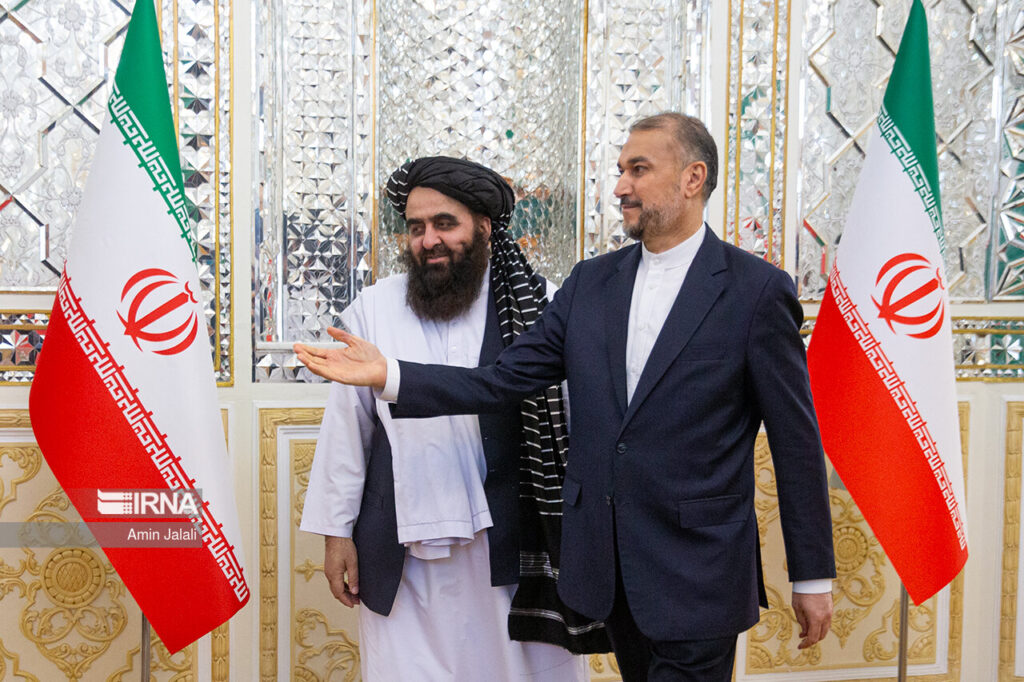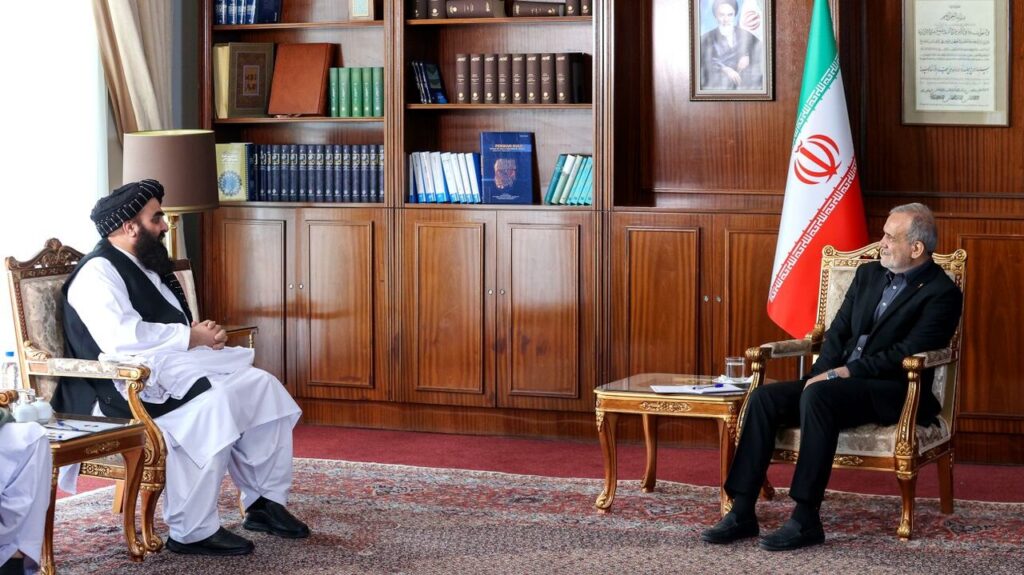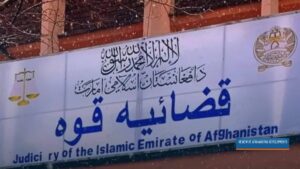Review of Afghanistan developments
The invitation extended to Mawlawi Amir Khan Muttaqi, the acting foreign minister of the Taliban government, to participate in the Tehran Dialogue Forum signifies a notable indication of the strengthening ties between Iran and the Taliban. This invitation was issued officially by the Iranian foreign minister, and the annual meeting in Tehran this year saw the attendance of representatives from 53 countries globally. Beyond serving as a venue for participants to express their perspectives, the forum also facilitates opportunities for consultations and bilateral discussions during the event.
During his address at the Tehran Dialogue Forum, Mottaqi outlined the Taliban government’s strategies and policies regarding internal governance, international relations, matters concerning the Islamic world, regional dynamics, and particularly emphasized the importance of enhancing bilateral ties between Iran and Afghanistan. Furthermore, in a discussion with President Massoud Pezeshkian, Foreign Minister Seyyed Abbas Araqchi, and other officials from the Islamic Republic of Iran, the two parties assessed their bilateral relations and exchanged perspectives.
Iran and Afghanistan on the Path to Balanced Policy and Good Neighborliness
Reports indicate that the meeting between Amir Khan Mottaqi and Iranian President Masoud Pezeshkian took place in a constructive environment, with both parties expressing sentiments that transcended mere diplomatic formalities, fostering a cordial atmosphere.
During this visit, Mottaqi articulated with unprecedented clarity that Afghanistan has maintained an imbalanced foreign policy for the past four decades, often exhibiting hostility towards other nations to appease a single power. He remarked, ‘We have now embraced a balanced policy that has proven advantageous for Afghanistan as well as neighboring and trans-regional countries, fostering closer ties between regional nations and the Afghan government.’ Mottaqi urged Iran to enhance bilateral cooperation and to avert Afghanistan’s reliance on foreign entities. Furthermore, in another segment of his address regarding water, he stated, ‘Even in the absence of the Helmand Treaty, we would have fulfilled this obligation, as we regard it our religious duty to provide water to those in need.’
During a meeting involving senior officials from both nations, the strong and shared commitment of Iran and Afghanistan to enhance economic and transit collaboration, particularly in the investment and development of border regions in their adjacent provinces, was highlighted. Pezeshkian pointed out the potential in the Khaf area, stating: ‘The capacity to generate 20,000 megawatts of wind energy in this region exemplifies the significant opportunities for partnership between Iran and Afghanistan.’ The Iranian President, in this discussion, underscored the importance of good neighborly relations and expressed: ‘We are eager to broaden our cooperation in a spirit of mutual understanding and feel it is our responsibility to assist the Afghan people based on our religious and ethical values.’
The importance and message of the Taliban government’s foreign minister’s visit to Iran
To comprehend the significance of the Taliban government’s foreign minister’s visit to Iran, a thorough and detailed examination of the nature of developments in Afghanistan and the surrounding region is essential.
Following the Cold War, the issues surrounding Afghanistan lost their national character, and various regional and global factors have influenced the fate of Afghanistan.
Since the end of the Zahir Shahi regime, Afghanistan has consistently encountered threats stemming from its inability to sustain a balance between Western and Eastern powers. While the Taliban administration has embraced a neutral foreign policy, the implementation of such a policy necessitates specific attributes that the current government lacks.
It is anticipated that the Taliban administration will embrace a pragmatic perspective and implement a region-focused and neighbor-oriented strategy, in light of the conflicting approaches of both the region and the West, particularly the United States. Political science and international relations, through the lens of systems theory, suggest that the sustainability of political systems is contingent upon their ability to adapt to their external environment.
Consequently, it is anticipated that the Taliban administration will embrace a pragmatic perspective and implement a region-focused and neighbor-oriented strategy, in light of the conflicting approaches of both the region and the West, particularly under the leadership of the United States. Political science and international relations, through the lens of systems theory, also assert that the sustainability of political systems hinges on their ability to adapt to their reign environment.
As Donald Trump embarks on a journey to the Middle East to showcase America’s influence amidst competition from China, Russia, and Iran, the importance of Amir Khan Mottaqi’s visit to Iran and subsequently to China, representing the Taliban government, conveys a substantial message to both the region and the US-led Western powers. This action taken by the Taliban government is crucial and must be factored into the evolution of regional dynamics and processes.
Institutionalization of relations between Iran and the Taliban government
The establishment of cordial and neighborly relations between Iran and the Taliban government is a complex process. This current state is a consequence of Iran’s pragmatic approach towards the Taliban and the Taliban’s favorable perception of the Islamic Republic of Iran. Both Kabul and Tehran have made significant strides in this direction, successfully navigating various challenges encountered at the outset.
This practical policy emerged during a time when, at the onset of the Taliban administration, a haze of conspiracy theories and perceptual difficulties obscured the relationship between the two nations. Although certain misunderstandings between the Taliban regime and Iran created opportunities for a crisis that favored opposing and harmful factions, both countries successfully established the principle of good neighborliness in their interactions through patience and wisdom.

The ongoing, unimpeded relations and interactions between Iran and the Taliban government over the last two years suggest that Iran has effectively navigated developments in Afghanistan and has established itself as a dependable ally.
Iran’s policy towards Afghanistan developments
Iran’s assessment of the situation in Afghanistan presents a significant and positive perspective, emphasizing that Afghanistan is a diverse society whose journey towards stability and progress relies on inclusive participation. Concurrently, Iran has refrained from endorsing any faction involved in violent and destabilizing actions in Afghanistan, instead advocating for all parties to partake in meaningful dialogue to achieve a national consensus.
The Taliban government’s indifference towards Iran’s ties with various Afghan political and social factions, whether supportive or opposed to the Taliban, can be implicitly understood as an endorsement of this Iranian strategy by the Taliban administration.
The Taliban government’s indifference towards Iran’s ties with various Afghan political and social factions, whether supportive or opposed to the Taliban, can be implicitly understood as an endorsement of this Iranian strategy by the Taliban government.
In light of the unsuccessful Western state-building initiative in Afghanistan and the emergence of a bipolar environment following the hasty withdrawal of the United States, Iran asserts that the future political framework of Afghanistan should be developed through both national and regional mechanisms, ensuring that the West is not afforded another chance to intervene in the new Afghan governance structure.
China and Russia have aligned themselves with Iran in this context, leading to Russia’s official acceptance of the Taliban government’s ambassador following China’s lead. By connecting India’s pragmatic alignment to the extensive and transparent interactions between China, Russia, and Iran with the Taliban government, it can be concluded that a regional cohesion is emerging, driven by the collective will of the region and the Taliban government to shape Afghanistan’s future. Given Iran’s cultural, social, linguistic, and geographical connections with various groups and domestic actors in Afghanistan, its role and influence in the regional framework for addressing the Afghan crisis appear to be more profound.
Related Articles:
The effects of Iran-US negotiations on Afghanistan
Conclusion

















